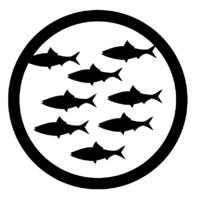November 10, 2023
Ocean Headlines: November
Estimated reading time: 0 minutes
BY: Vaishali Dassani
Topics:
The news cycle continues to shift every minute, giving us a constant stream of new information. That’s why Oceana Canada is sharing a monthly roundup of the latest ocean news, to provide you with a one-stop destination for all things oceans.
North Atlantic right whales took to the spotlight in media in Late October, Fisheries and Oceans Canada announced a new assessment for northern cod, and journalists covered the impact of plastic pollution on the environment. Read on to learn more!

Sponging Up Plastic Pollution
Hakai, October 5
Researchers in China recently published a study describing their development of a synthetic sponge that makes short work of microscopic plastic debris. In tests, the researchers showed that when a specially prepared, plastic-filled solution is pushed through one of these sponges, the sponge was able to remove both microplastics and even smaller nanoplastics from the liquid. Read more.

Ships Speeding through U.S. ‘go slow’ zones meant to protect endangered whale – report
Reuters, October 19
A new Oceana report reveals that more than 80 per cent of ships are speeding through “go slow” zones set by environmental regulators along the East Coast of the United States to protect endangered North Atlantic right whales. Using data from Global Fishing Watch, Oceana analyzed boat speeds from November 2020 through July 2022 in slow zones established by the National Oceanic and Atmospheric Administration (NOAA). Oceana has continuously urged regulators like NOAA to increase the enforcement of the speed restrictions. Gib Brogan, Oceana’s Campaign Director, says, “Boats are speeding, and whales are dying — it’s just that simple.”

Canada promised to stop exporting unwanted plastic waste. But it’s still happening.
The Canadian Press, October 19
Despite being part of an international treaty to prevent dumping plastic waste in developing countries, Canada’s waste that goes into a blue bin has ended up in trash heaps 11,000 kilometres away in Myanmar. Read more to find out why and how Canada’s plastic waste is ending up here.

After years of decline, endangered right whale populations could be levelling off
The Canadian Press, October 123
While the population of North Atlantic right whales seem to be stabilizing after years of declines, scientists say that the number of human-caused injuries are on the rise. A recent flattening of the population trend indicates that human activities are killing as many whales as are being born each year. Oceana Canada’s Campaign Director, Kim Elmslie, said, “The (whales) are coping with a changing climate and the ever-present threats of entanglement in fishing gear and vessel strikes. Our governments can still save this fragile population from extinction, particularly if [it] invests in long-term funding for science, monitoring and enforcing protection measures.”

New DFO northern cod assessment model shows stock out of critical zone
CBC News, October 25
Fisheries and Oceans Canada (DFO) has implemented a new assessment model for the 2J3KL northern cod stock, which reveals the stock has likely been out of the critical zone since 2016. The new model assesses the long-term productivity using tagging and landing data from the last 70 years. DFO plans to use the new assessment in March 2024 to estimate the population status of this cod stock. Read more.

Western University professor looks at ‘greenwashing’ and how to stop it
CBC News, October 30
A recent report released by Western University’s Ivey Business School, in collaboration with the University of Michigan, highlights how large corporations “greenwash” their products or brand. It looks at the role private business plays in sustainability and the dangers of misleading consumers. Anthony Merante, Oceana Canada’s Plastic Campaigner, believes that companies need to begin their journey of climate action by reducing plastic consumption.
“[Plastic pollution] is the second most important threat behind climate change, according to the UN,” said Merante.
MOST RECENT
March 6, 2025
February 3, 2025
January 22, 2025
Celebrating New Beginnings in 2025: Four Right Whale Calves Spotted Off Florida Coast

